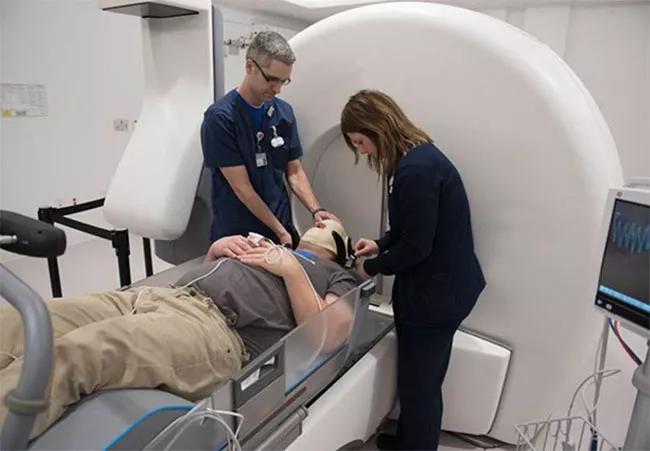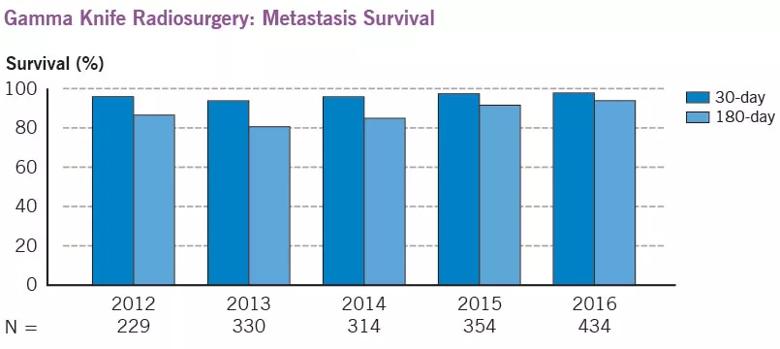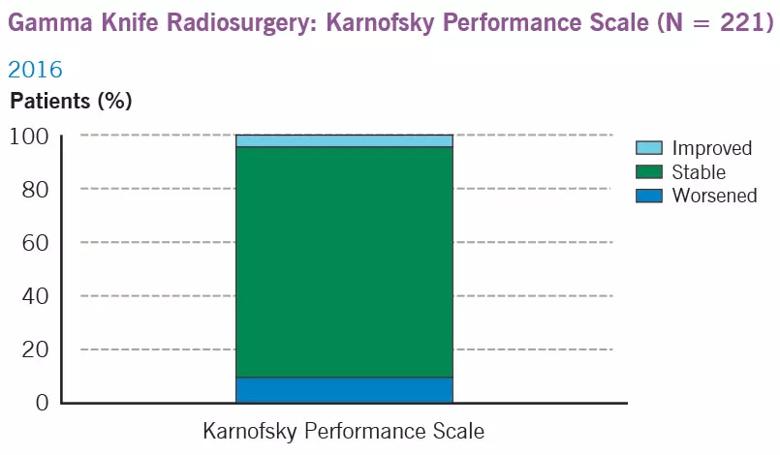More patients being treated, with encouraging survival and functional outcomes

Brain metastases are a dreaded complication of lung and breast cancer, melanoma and other malignancies, as they are associated with poor prognosis: On average, patients survive approximately 12 months after diagnosis.
Advertisement
Cleveland Clinic is a non-profit academic medical center. Advertising on our site helps support our mission. We do not endorse non-Cleveland Clinic products or services. Policy
Gamma Knife® stereotactic radiosurgery (SRS), especially when used as an adjunct to other therapies, offers a better chance of longer survival. It delivers precise, highly focal control of brain metastases with few side effects. A major advantage of SRS compared with whole-brain radiation therapy is that patients need not stop the systemic therapy critical to optimal treatment of their primary cancer while undergoing SRS.
“Cleveland Clinic has more than 20 years of experience with Gamma Knife radiosurgery,” says Manmeet Ahluwalia, MD, Director of the Brain Metastasis Research Program and Head of Operations in Cleveland Clinic’s Rose Ella Burkhardt Brain Tumor and Neuro-Oncology Center. “Our center is a world leader in advancing the technique and refining which patient populations are most appropriate for therapy.”
Data snapshots from Cleveland Clinic Neurological Institute’s 2016 Outcomes Book show that the number of patients undergoing Gamma Knife radiosurgery at Cleveland Clinic has nearly doubled in recent years, from 229 in 2012 to 434 in 2016 (see graph below).
Dr. Ahluwalia attributes these rising numbers to an increase in the number of patients with brain metastases as well as to the increasing role of SRS in the management of these patients.
Despite this expanding patient population for Gamma Knife therapy, safety outcomes in 2016 remained excellent: The 30-day survival rate was 98 percent, and 94 percent of patients lived for at least six months (see graph below).

Maintenance of cognitive function is always of concern with metastatic brain disease, whether patients are being treated with radiation therapy or other modalities, according to Dr. Ahluwalia. Cleveland Clinic routinely collects data on patients’ functional performance measures before and after Gamma Knife radiosurgery. The Karnofsky Performance Status scale is a standard tool used for patients with cancer to assess their ability to perform ordinary tasks.
Advertisement
Data on performance status were available for 221 patients who underwent SRS at Cleveland Clinic in 2016. They show that the vast majority of these patients (91 percent) either remained stable or improved following SRS (see graph below). A change in status was defined as a change of at least 20 points on the 100-point scale.

“Stereotactic radiosurgery is an important tool in our armamentarium for fighting metastatic brain disease,” says Dr. Ahluwalia. “It’s reassuring that routine measurement of outcomes demonstrates its safety. This modality is particularly exciting because it is an outpatient single-day procedure for most patients and can be more easily combined with targeted therapy and immunotherapy when compared to whole-brain radiation.”
For additional recent volume and outcomes data from the Burkhardt Brain Tumor and Neuro-Oncology Center, see the 2016 Outcomes Book from Cleveland Clinic Neurological Institute.
Advertisement
Advertisement

First-of-its-kind research investigates the viability of standard screening to reduce the burden of late-stage cancer diagnoses

Global R&D efforts expanding first-line and relapse therapy options for patients

Study demonstrates ability to reduce patients’ reliance on phlebotomies to stabilize hematocrit levels

A case study on the value of access to novel therapies through clinical trials

Findings highlight an association between obesity and an increased incidence of moderate-severe disease

Cleveland Clinic Cancer Institute takes multi-faceted approach to increasing clinical trial access 23456

Key learnings from DESTINY trials

Overall survival in patients treated since 2008 is nearly 20% higher than in earlier patients